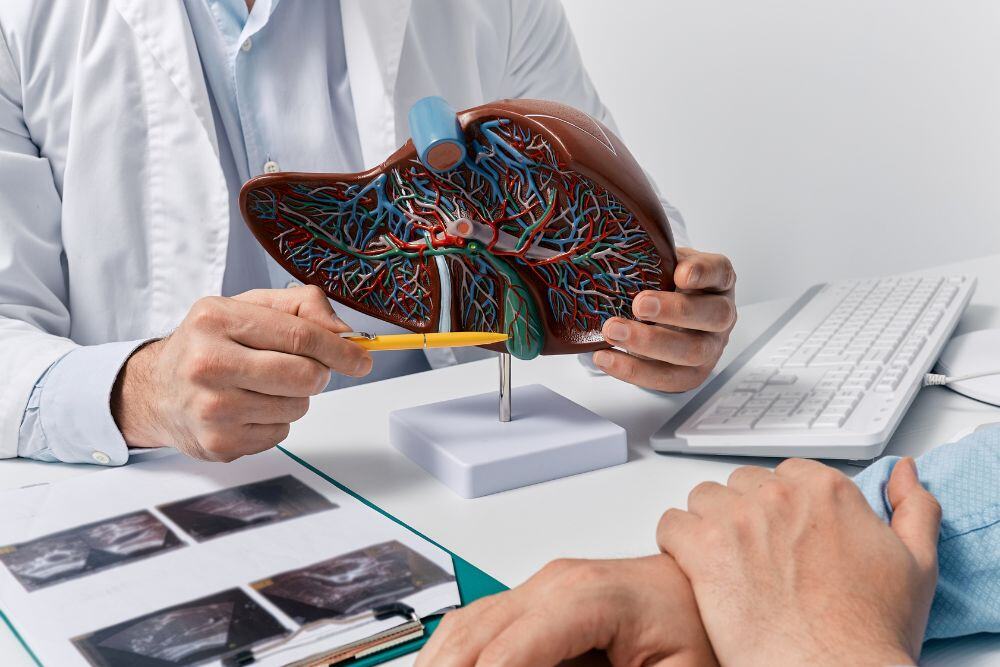Liver Cancer Care in Portland-Vancouver
The liver is part of your gastrointestinal (GI) system, working with the stomach, pancreas, and intestines to digest food. The liver also aids in detoxifying the blood, regulating chemicals in the blood, hormone regulation, vitamin storage, and waste removal.
When cancer develops in the liver, it is most often hepatocellular carcinoma (HCC).
Several less common types include intrahepatic cholangiocarcinoma and hepatoblastoma.
After a diagnosis, an oncologist who specializes in GI cancers will provide a treatment plan for your specific type of liver cancer. Our team is here to guide patients in the Portland and Vancouver areas through their cancer care journey.
Why Choose Compass Oncology for Liver Cancer Treatment?
The GI cancer care team at Compass Oncology is led by one of our medical oncologists specializing in liver cancer. They meet with our liver surgical oncologist and a radiation oncologist to create a personalized treatment plan. We also provide access to liver cancer clinical trials.
What Are the Signs & Symptoms of Liver Cancer?
If you experience any of the following symptoms, you should contact your physician:
- Hard lump on the right side just below the rib cage
- Discomfort in the upper abdomen on the right side
- Pain around the right shoulder blade
- Unexplained weight loss
- Itching
- Jaundice (yellowing of the skin and whites of the eyes)
- Unusual tiredness
- Nausea
- Loss of appetite
- Feeling full after not eating much food
Your primary care provider (PCP) may refer you to a hepatologist, a specialist in liver disorders, or a gastroenterologist, who specializes in digestive organs, based on your symptoms.
From Our Blog: More Information About Liver Cancer
Liver Cancer Risks and Screening
 There are several risk factors that could lead to screening for liver cancer. Learn more about what increases your risk for liver cancer and when to talk to your doctor about possible screening options.
There are several risk factors that could lead to screening for liver cancer. Learn more about what increases your risk for liver cancer and when to talk to your doctor about possible screening options.
Diagnosis of Liver Cancer

If liver cancer is suspected based on your symptoms, your doctor will order diagnostic tests to look for cancerous cells. Learn about the types of tests used to diagnose liver cancer.
Liver Cancer Staging

After a liver cancer diagnosis, your oncologist will need to know the extent (stage) of the cancer and how much damage it has caused to the liver. The stage is an important factor that also determines if liver cancer can be removed with surgery or not, influencing the recommended treatment plan and prognosis.
Treatment Types for Liver Cancer

Your treatment plan will vary based mainly on how much of the liver is affected by cancer, its stage, if the cancer can be surgically removed, and your overall health. Read through the types of treatments that could be used to treat liver cancer like surgery, ablation, embolization, radiation therapy, targeted therapy, immunotherapy, chemotherapy, and clinical trials.
Liver Surgical Oncology
 Surgery is frequently part of the liver cancer treatment plan. At Compass Oncology, our team includes a hepato-pancreato-biliary (HPB) surgeon familiar with the latest liver cancer surgical procedures. They will be a part of the assessment to see if surgery is possible and the most suitable surgical procedure for your specific situation.
Surgery is frequently part of the liver cancer treatment plan. At Compass Oncology, our team includes a hepato-pancreato-biliary (HPB) surgeon familiar with the latest liver cancer surgical procedures. They will be a part of the assessment to see if surgery is possible and the most suitable surgical procedure for your specific situation.

